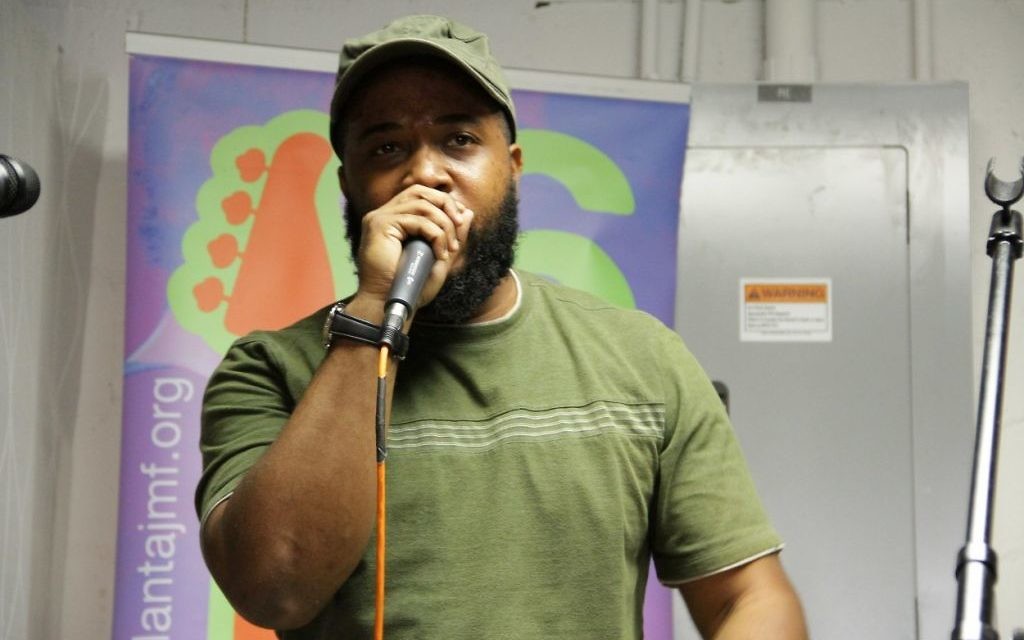Positive Rap to Set Beat at Hawks Game
Reuben “Prodezra Beats” Formey isn’t your average rapper.
The Savannah native is on a mission to spread a positive Jewish message through hip-hop and will get one of his biggest breaks when he performs at the Atlanta Hawks’ Jewish Heritage Night on Saturday, Dec. 12, in a sold-out Philips Arena before the Hawks face the San Antonio Spurs.
Formey’s inspirational music is heavily influenced by his spiritual journey from Savannah to Jerusalem to study at a yeshiva and back to Georgia in live in Atlanta. He spoke to the Atlanta Jewish Times by phone.
Get The AJT Newsletter by email and never miss our top stories Free Sign Up
AJT: Tell me how you got booked to perform at the Atlanta Hawks Jewish Heritage Night.
Prodezra Beats: Well, I’ve been doing inspirational, positive hip-hop music for a while now. Rabbi Levi Mentz, who is running the event, reached out to me and was looking for an artist that was uptempo to keep the crowd involved in connection with the menorah lighting at the stadium. I thought it would be a great thing for the Jewish community and the fans before the game.
AJT: Tell me about your Jewish identity and your journey to discover it.
PB: I was not always as observant as I am now. My parents began studying Judaism in the ’70s in Minnesota with Rabbi Manis Friedman, and years later, after long study and shortly before my bar mitzvah, we actually all converted as a family. After my bar mitzvah I kind of got away from my Jewish roots. It wasn’t until my college years that I realized G-d was slapping me upside the head and trying to get me to go down a better path. So I went to Israel with my sister to learn and study. From there, everything changed. I got married and had a child on the way. It changed my life.
AJT: How has that involvement with Judaism affected your music?
PB: It’s everything. Before I became more deeply ingrained in my Judaism and in practicing, I was also doing hip-hop and producing music that wasn’t so positive. When I made a transition and went to Israel, the people I was around told me that if G-d is giving you the talent to do something, don’t throw it away, but use it to give to others and spread a positive message. A lot of people are shocked because they don’t see it so much anymore, but hip-hop started as a positive thing.
AJT: What are some of the most common messages in your music?
PB: As of late, I’ve been putting an emphasis on your personal relationship with G-d. My new album is called “Face to Face,” and the idea behind that is the things in life we go through that challenge us. It’s not because G-d hates us; it’s to make us grow. I also speak a lot about being strong in prayer and overcoming obstacles, as well as topics like drug abuse, which can be a problem in the Jewish community too.
AJT: Your music is more focused and message-driven than many other Jewish hip-hop artists. How do you compare yourself to other Jewish rappers?
PB: Some hip-hop artists address the more secular side of Jewish rap. Someone like Kosha Dillz is a good guy, and he definitely has some positive content. Other acts like Lil’ Dicky or Hoodie Allen may be considered even more secular. For myself, being so connected with Chabad, I chose to keep things just directly focused on a specific kind of inspirational message. There’s always a deep, underlying message from every song that you can carry with you in your everyday life. Nothing negative towards anything that they do because they are good guys. That’s just the way I decided to go.
—
What: Jewish Heritage Night
Where: Philips Arena
When: 7:27 p.m. Saturday, Dec. 12
Tickets: $39 to $129; www.atlantajewishheritage.com






comments